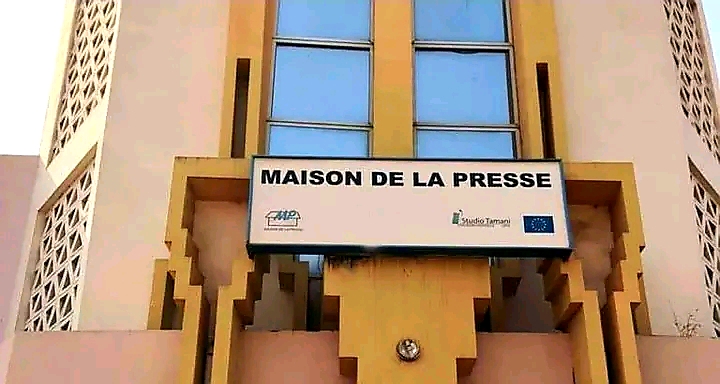Photo credit: Aly Diabaté
The life of a journalist in Mali is a daily struggle. In this blog post, we will address the precariousness of the journalist profession in Mali. The one we will call IT is a Malian journalist, a dedicated family man who has to deal with derisory salaries, the absence of social security and permanent economic insecurity.
It’s 5 o’clock in the morning. IT’s wife gets up early to do her small business selling pancakes in this outlying district of Bamako, where the couple lives in an apartment they rent for 30,000 francs a month. At 7 o’clock, the children wake up, the mother gives them pancakes for breakfast. IT, on the other hand, is not going to eat the traditional family meal today because he has an event to cover from 9 am. There, he will eat at the coffee break. He will also be able to send meal money to his wife once he has his by the way*, “the final press release”. This money will enable his wife to make a little profit today on her business, which sometimes feeds the whole family. She earns an average of 2000 CFA profit per day.
* Daily allowance paid to an employee when he goes on a business trip abroad.
Live day to day
After dropping off her two children at school, IT takes 2,000 CFA francs worth of gas on credit from her friend to be able to attend her conference. Once there, he tries to get the list of invited media and, unsurprisingly, his organ is not on it. However, he wrote his name there in the hope of touching the precious sesame: “the final press release”. When the conference is over, the communication officer decides to give only the per diem to the invited media. After interview, IT ends up having five thousand instead of ten thousand.
freedom from disorder
Following the fall of the dictatorial regime, Mali witnessed a proliferation of “free” media. However, several of these media were created as local development tools or to carry the voice of politicians… In Mali, according to Reporters Without Bordersthere are more than 200 newspaper titles, more than 500 radio stations and several dozen television channels.
AC, the editor of IT, after three years as a journalist in a press organ that could no longer pay him, also decided to create his own newspaper. Once his degree in modern letters was finished, not having the means to go to training, IT went to do an internship at AC, the new press boss. However, AC deplores this precariousness in the profession. ” It’s complicated to have the advertisements in order to support the expenses of the newspaper » he explains, before adding « quhe regrets not being able to pay his journalists, every month ».
The need for reform
Creating businesses that can bring in money is the major challenge of the profession. Added to this is the adaptation to modernity, which offers other possibilities for monetizing content as well as the establishment of conventions allowing the autonomy of the press.
It is 5 pm, IT takes leave of his friend and colleague from another organ who passes him his cigarette butt. They thus meet at night on WhatsApp, for the schedule of the next day’s activities.
